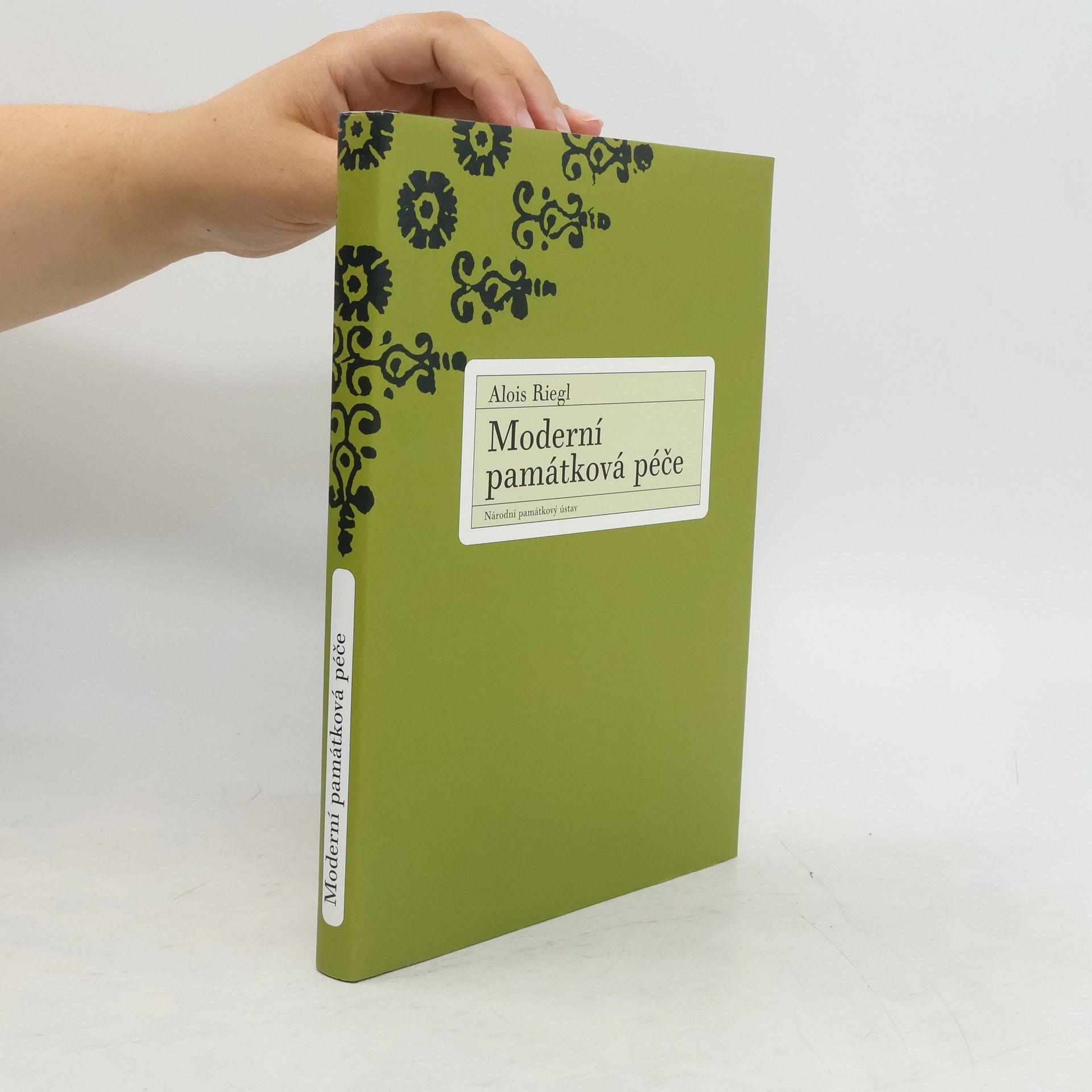Kniha obsahuje stručný životopis A. Riegla, výklad jeho teorií a koncepcí i jejich aplikaci na české poměry. Teorie památkové péče - její podstata a vývoj. První ucelená a historicky zdůvodněná soustava hodnot moderní památkové péče. Souběžný německý text.
Alois Riegl Knihy
Alois Riegl byl rakouský historik umění a je považován za člena Vídeňské školy dějin umění. Byl jednou z klíčových postav při zakládání dějin umění jako samostatné akademické disciplíny a jedním z nejvlivnějších představitelů formalismu. Jeho práce se zaměřila na rozvoj formálních uměleckých analýz a na pochopení uměleckých děl v jejich vlastním kontextu.







Historical Grammar of the Visual Arts
- 496 stránek
- 18 hodin čtení
A to is Riegl (1858-1905) was one of the greatest modern art historians. The most important member of the so-called "Vienna School," Riegl developed a highly refined technique of visual or formal analysis, as opposed to the iconological method with its emphasis on decoding motifs through recourse to texts. Riegl also pioneered understanding of the changing role of the viewer, the significance of non-high art objects or what would now be called visual or material culture, and theories of art and art history, including his much-debated neologism Kunstwollen (the will of art). At last, his Historical Grammar of the Visual Arts, which brings together the diverse threads of his thought, is available to an English-language audience, in a superlative translation by Jacqueline E. Jung. In one of the earliest and perhaps the most brilliant of all art historical "surveys," Riegl addresses the different visual arts within a sweeping conception of the history of culture. His account derives, from Hegelian models but decisively opens onto alternative pathways that continue to complicate attempts to reduce art merely to the artist's intentions or its social and historical functions. Book jacket.
Problems of style
- 406 stránek
- 15 hodin čtení
Demonstrating an uninterrupted continuity in the history of ornament from the ancient Egyptians through the Islamic period, this treatise argues that art is completely independent from exterior conditions and is beyond individual volition.
Alois Riegl Collected Essays
- 332 stránek
- 12 hodin čtení
Alois Riegl significantly shaped art history as a distinct academic discipline, emerging from the Vienna School of Art History. His early work included a dissertation on the Romanesque Church of St. Jacob and a focus on medieval calendar manuscripts. As curator at the Austrian Museum, he published influential texts like Altorientalische Teppiche and Stilfragen, showcasing his interdisciplinary approach. Riegl's lectures on baroque art challenged prevailing views, contributing to a reevaluation of the period and establishing a foundational methodology in art history.
Historische Grammatik der bildenden Künste
- 377 stránek
- 14 hodin čtení
Die lange vergriffene "Historische Grammatik der bildenden Kunste" ist eine bedeutende und einflussreiche Abhandlung uber die Kunstgeschichte. IN diesem bahnbrechenden fragmentarischen Werk bietet Alois Riegl von der Antike bis zur Moderne einen Querschnitt durch die Epochen der Kunstgeschichte. DEr Autor ermittelt invariante Elemente der bildlichen Darstellung: die Zwecke der Produktion von Bildern, ihre Motive sowie die wesentliche Beziehung zwischen Flache und Form. DIese Elemente wandeln sich nach den Ausdrucksnotwendigkeiten von Ort und Zeit. ALs Interpret der Kunstgeschichte und der Geschichte der Weltanschauungen und als Gegner jeglicher Art des technizistischen Materialismus entwickelt Riegl Beobachtungen, die so unterschiedliche Autoren wie Spengler, Panofsky, Deleuze, Feyerabend und nicht zuletzt Benjamin anregen sollten. DAs ehrgeizige Projekt dieser "Historischen Grammatik", die - vielleicht nicht zufallig - ein Entwurf blieb, bietet neuartige interpretatorische Mittel zur Auseinandersetzung mit der Kunst.
Altorientalische Teppiche
- 214 stránek
- 8 hodin čtení
Eines der ersten wissenschaftlichen Werke zum Orientteppich, das in seiner prinzipiellen Orientierung kaum zu überholen ist, und das noch nach mehr als hundert Jahren zu den Standardwerken der Teppichwissenschaft gehört, deren Standards es mitprägte. Die Einführung gibt eine Übersicht über dieses Schrifttum.
Volkskunst, Hausfleiss und Hausindustrie
- 87 stránek
- 4 hodiny čtení
Riegls schmale Untersuchung eröffnete eine bis heute nicht abgeschlossene Diskussion um die Faktoren, die für eine kategoriale Trennung von Volkskunst und Hochkunst genannt werden können.
Stilfragen
- 370 stránek
- 13 hodin čtení
Stilfragen - Grundlegungen zu einer Geschichte der Ornamentik ist ein unveränderter, hochwertiger Nachdruck der Originalausgabe aus dem Jahr 1893. Hansebooks ist Herausgeber von Literatur zu unterschiedlichen Themengebieten wie Forschung und Wissenschaft, Reisen und Expeditionen, Kochen und Ernährung, Medizin und weiteren Genres. Der Schwerpunkt des Verlages liegt auf dem Erhalt historischer Literatur. Viele Werke historischer Schriftsteller und Wissenschaftler sind heute nur noch als Antiquitäten erhältlich. Hansebooks verlegt diese Bücher neu und trägt damit zum Erhalt selten gewordener Literatur und historischem Wissen auch für die Zukunft bei.